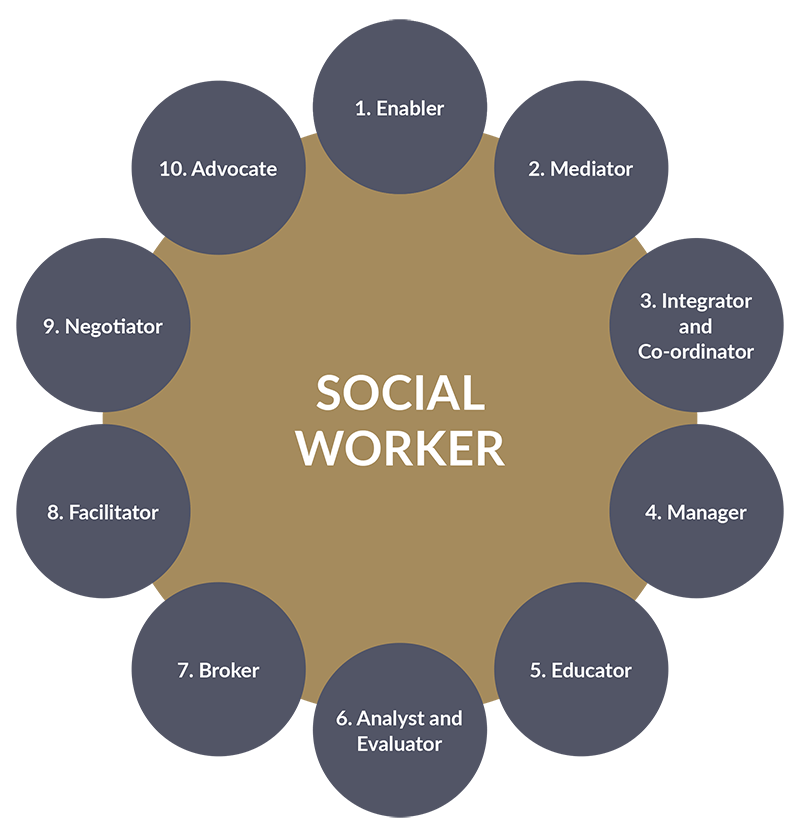Social Work vs Counseling & Occupational Therapy
 A formalized response to the social needs of individuals, communities, and society has existed throughout the centuries.
A formalized response to the social needs of individuals, communities, and society has existed throughout the centuries.
Before the advent of social work as a profession, charitable and religious organizations had to meet the social needs of individuals, communities, and society as a whole.
Social work started to develop in the 19th century in the wake of the Industrial Revolution and became increasingly formalized as a discipline during the Great Depression (Dorrien, 2011). There was a great need for such work in society (Mizrahi and Davis, 2008).
Social work is currently a diverse global profession with roots in philanthropic and community organizations. It is a helping profession and bears great similarity to disciplines like psychology, counseling, and occupational therapy. However, there are differences too.
If you are interested in social work as a career and want to know more, then please read on. You will learn how it differs from other similar caring professions. You can then decide if it is the best helping profession for you.
Before you continue, we thought you might like to download our three Meaning and Valued Living Exercises for free. These creative, science-based exercises will help you learn more about your values, motivations, and goals and give you the tools to inspire a sense of meaning in the lives of your clients or service users.
This Article Contains:
What Is Social Work? 10 Roles of Social Workers
Social work is an extensive discipline, almost as broad as the discipline of psychology. It is an academic discipline and a practice-based profession (Canadian Association of Social Workers, n.d.).
It isn’t easy to define because it is both an activity and a profession (Askeland & Payne, 2001). The changing nature of social work in the 21st century means that any definitions of social work are dynamic and ever evolving (Hare, 2004). Social work practice is influenced by the expectations of the role in each country and the agency in which social workers practice (Baginsky, 2014).
Social work involves micro and macro work with individuals, families, groups, communities, and also society as a whole. It attempts to meet the basic needs of society and enhance social functioning (Canadian Association of Social Workers, 2020).
Social functioning is the ability of an individual to perform their social role in their immediate social environment and society at large (Canadian Association of Social Workers, 2020).
Social workers step in to enhance social functioning. They protect children and adults from harm and support their needs (British Association of Social Workers, n.d.).
The International Federation of Social Workers (2014) underpins its definition of social work by the principles of human rights, social justice, and collective responsibility, showing respect for diversity.
“Social work is a practice-based profession and an academic discipline that promotes social change and development, social cohesion, and the empowerment and liberation of people.”
International Federation of Social Workers, 2014
Reinforced by social work theories and social sciences, humanities, and indigenous knowledge, the definition considers social work to engage people and structures, address the challenges of life, and enhance wellbeing (International Federation of Social Workers, 2014).
Social workers liaise with health and care professionals, teachers, and police. The professional they have the most contact with depends on their specialty. Children and family social workers have frequent contact with foster care systems (Austerberry et al., 2013).
In the United States, social workers are often employed in private practice, as counselors or therapists. There is emphasis on their clinical skills, which take up much of their work (National Association of Social Workers, 2011).
This is rarely the case in the United Kingdom, where they tend to be government employees. If social workers are employed in private settings in the United Kingdom, it tends to be in residential care settings or by agencies (Orellana, 2014).
10 Roles of Social Workers
Social workers take on many roles and can feel uncertain about their job responsibilities and performance (Blomberg, Kallio, Kroll, & Saarinen, 2014).
Role ambiguity and conflicts are frequently reported factors that cause stress among social workers. This can lead to poor retention of the social workforce (Coyle, Edwards, Hannigan, Fothergill, & Burnard, 2005; Pasupuleti, Allen, Lambert, & Cluse‐Tolar, 2009; Kim, 2011; Webb & Carpenter, 2011; Blomberg et al., 2014).
Here are some of these many roles.
1. Enabler
If you decide to become a social worker in the enabler role, you will help your client or service user cope with stressful situations. You will convey hope, reduce resistance and ambivalence, and recognize and manage feelings. You will identify and support personal strengths and break down problems into manageable solutions. Your focus will be on goals and achieving them (Barker, 1995; Dominelli, 2009).
2. Mediator
The mediator role involves neutrality and resolving conflict within micro-, mezzo-, or macro-systems. At the micro and mezzo levels, you could use your mediator skills to help in family, divorce, and child custody cases (Zastrow & Kirst-Ashman, 1997). At the macro level, you could support various subsystems within a community to work out their differences.
3. Integrator and coordinator
You will show integration and coordination to bring parts together in a unified way (Yessian & Broskowski, 1983).
4. Manager
This role requires managing administrative responsibilities, acquiring and allocating resources, and coordinating activities to achieve goals. Monitoring, assessing, and making changes in processes and structures to improve their effectiveness are also involved in the manager role (Barker, 1995).
5. Educator
As an educator, you will inform and teach skills to clients and service users. It is essential to be an excellent communicator to convey information clearly (Zastrow & Kirst-Ashman, 1997).
6. Analyst and evaluator
Social workers must analyze and evaluate how well interventions, programs, and systems are working (Zastrow & Kirst-Ashman, 1997).
7. Broker
In the broker role, you will help link clients, groups, and communities with resources and services. A social worker needs to be familiar with community services and have general knowledge about eligibility requirements. An example of brokering is obtaining emergency food, housing, and legal aid (Zastrow & Kirst-Ashman, 1997).
8. Facilitator
A facilitator is another vital role of a social worker. As a social worker, you will facilitate a variety of groups. In this context, social workers attempt to enhance change through improved lines of communication (Barker, 1995; Dominelli, 2009).
9. Negotiator
Similar to a mediator role, social workers may also perform a negotiator role. This involves finding a middle ground and achieving consensus as an ally with one of the sides (Zastrow & Kirst-Ashman, 1997).
10. Advocate
The advocate role is one of the most critical roles for social workers (Zastrow & Kirst-Ashman, 1997; Asquith, Clark, & Waterhouse, 2005; Dominelli, 2009). In the advocate role, you will step forward and speak on behalf of service users and clients, groups, and the community.
Social Work vs Counseling

They attempt to help and support clients of all types. The most significant difference between the two professions is most likely the educational pathway, skill requirements, and certification.
Similarities
- Professional social work and counseling positions require at least a bachelor’s degree. They both require practical work experience for certification.
- Social workers and counselors both work with children and families.
- Critical thinking and good communication are essential skills for social workers and counselors (Schneider, 2020).
Differences
- Social work requires a good understanding of social policy.
- Counseling students requires a good understanding of human development.
- Social workers focus on providing many services within social service systems.
- Social workers refer patients to other services and resources to provide them with the complete and specialized treatment they need.
- Counselors provide support in only one type of service directly to the client group.
- The service user population differs. Social workers do not always have clients with mental health and emotional difficulties, although they often can. Counselors always work with individuals with emotional and mental health difficulties (Schneider, 2020).
Psychology vs Social Work
Some of the similarities and differences between psychologists and social workers include the following.
Similarities
- Social workers’ careers often begin with a social work degree.
- Psychologist certifications also require a degree in the field of psychology.
- Both areas of work require ongoing supervision and practical work experience.
- Social workers and psychologists have a shared objective: to support members of the community.
Differences
- Social welfare policy is necessary for study in social work. A master’s degree allows further specialization and the development of specific social work skills.
- Social workers provide practical support through advocacy and resource allocation.
- Social workers have irregular and varied schedules. Many of their roles require emergency and on-call work.
- Psychologists study social psychology, cognitive development, brain and behavior, abnormal psychology, developmental psychology, research methods, and a variety of other topics. There are many types of specialties, such as clinical or school psychology.
- You will take a more specialized route of study as a psychologist, requiring either master’s or a doctoral degree.
- Psychologists are trained in assessment, testing, research, observation, and reporting. This encompasses most of their daily work.
- Psychologists tend to have more regular work patterns (Schneider, 2020).
Occupational Therapy or Social Work?

Occupational therapists empower people to perform the occupations that foster health and wellbeing. This allows individuals to participate in the daily occupations of life (Townsend & Polatajko, 2013).
Occupational therapists are more aligned to healthcare, whereas social workers are considered more in line with advocacy. There appear to be more differences than similarities between these two roles.
Similarities
- Occupational therapists and social workers both need good communication and collaboration skills. This is vital.
- Occupational therapists perform work for the betterment of people in need, just like social workers (Psychology School Guide, n.d.).
Differences
- Occupational therapists require a basic degree and two additional years of graduate study.
- Employment as a social worker typically requires a bachelor’s degree. It is not essential to undertake graduate study, although many do if they wish to specialize further.
- Occupational therapists help people with physical, mental, and developmental disabilities. This involves training people to do everyday tasks. Service users may have experienced severe injuries or disabilities. Occupational therapists help with essential cooking, eating, and dressing. Patients with permanent and severe disabilities are trained to use adaptive equipment like wheelchairs, orthotics, mobility devices, and supportive aids.
- Some occupational therapists work with people whose ability to do their job has been impaired. They help retrain the client, find them a job, and plan re-adjustment activities (Psychology School Guide, n.d.).
- Social workers do not necessarily undertake hands-on practical work like occupational therapists. Their day-to-day work involves assessing people’s needs, strengths, and wishes. They strive to make a change and solve problems; they organize support and make recommendations, and they refer to other services and agencies (British Association of Social Workers, n.d.).
PositivePsychology.com’s Useful Resources
We hope that this article has piqued your interest in becoming a social worker. If so, we also have an article that compiles everything you need to know about training programs and degrees in social work. The article tells you about the top 25+ programs, degrees, and online options to become a social worker.
There are abundant resources available to help you decide if you want to enter the world of social work, such as our article on the essential skills and values of social workers, as well as social work methods and interventions for helping others.
If you love reading, then this is your first stop: 12 Social Work Books Every Practitioner Should Read.
For even more useful resources to allow you to increase empathy, listening, and communication, take a look at the following free resources from our blog.
- Self-Care Check-In
This worksheet can help you combat the adverse effects of stress if you are considering social work. After all, it can be a demanding career as well as a satisfying one. - My Self-Care Promise
Before taking care of others, as a social worker, you need to take care of yourself. This worksheet helps you start by focusing on yourself. - Social Problem Solving: Brainstorming
This is a great worksheet that helps with brainstorming ideas. As a social worker, you will often brainstorm ideas for possible solutions to a problem. - Anger Exit and Re-Entry Routines
Social workers can face conflict in family situations that become heated. Tools for managing conflict situations can be helpful. This checklist of strategies will be beneficial if you enter social work and includes techniques for managing anger more effectively.
If you’re looking for more science-based ways to help others discover meaning, this collection contains 17 validated meaning tools for practitioners. Use them to help others choose directions for their lives in alignment with what is truly important to them.
A Take-Home Message
If you want to work in a role that helps and supports others, you may be considering social work, counseling, psychology, or occupational therapy. They are all different, but have many similarities too.
Social work is one of many caring professions and can be a satisfying and rewarding career. Comparing and contrasting the different helping professions can help you make the right choice for you.
We hope this article has helped you understand if social work is for you. Social workers take on several different roles, often more than one at a time.
So why don’t you explore the roles in social work, compare and contrast with the other professions, and look at the resources?
You will be able to gain a good impression of what is required of you if social work is your job choice.
We hope you enjoyed reading this article. Don’t forget to download our three Meaning and Valued Living Exercises for free.
- Askeland, G. A., & Payne, M. (2001). What is valid knowledge for social workers? Social Work in Europe, 8(3), 13‐23.
- Asquith, S., Clark, C., & Waterhouse, L. (2005) The role of the social worker in the 21st century – A literature review. The Scottish Executive. Retrieved July 26, 2021, from http://www.scotland.gov.uk/Resource/Doc/47121/0020821.pdf
- Austerberry, H., Stanley, N., Larkins, C., Ridley, J., Farrelly, N., Manthorpe, J., & Hussein, S. (2013). Foster carers and family contact: Foster carers’ views of social work support. Adoption & Fostering, 37,(2), 116‐129.
- Baginsky, M. (2014). Social work: Training for the profession or task? Winston Churchill Travelling Research Fellowship 2013. Winston Churchill Trust.
- Barker, R. L. (1995). The social work dictionary (3rd ed.). NASW Press.
- Blomberg, H., Kallio, J., Kroll, C., & Saarinen, A. (2014). Job stress among social workers: Determinants and attitude effects in the Nordic countries. British Journal of Social Work, 45(7), 2089–2105.
- British Association of Social Workers. (n.d.) What do social workers do? Retrieved July 22, 2021, from https://www.basw.co.uk/resources/become-social-worker/what-do-social-workers-do
- Canadian Association of Social Workers. (n.d.). What is social work? Retrieved July 23, 2021 from https://www.casw-acts.ca/en/what-social-work
- Canadian Association of Social Workers. (2020, June). CASW social work scope of practice. Retrieved July 18, 2021 from
https://www.casw-acts.ca/en/what-social-work/casw-social-work-scope-practice - Coyle, D., Edwards, D., Hannigan, B., Fothergill, A., & Burnard, P. (2005). A systematic review of stress among mental health social workers. International Social Work, 48(2), 201‐211.
- Dominelli, L. (2009). Introducing social work. Polity Press.
- Dorrien, G. (2011). Social ethics in the making: Interpreting an American tradition. John Wiley & Sons.
- Hare, I. (2004). Defining social work for the 21st century: The International Federation of Social Workers’ revised definition of social work. International Social Work, 47(3), 407‐424.
- International Federation of Social Workers. (2014, July). Global definition of social work. Retrieved July 21, 2021, from https://www.ifsw.org/what-is-social-work/global-definition-of-social-work/
- Kim, H. (2011). Job conditions, unmet expectations, and burnout in public child welfare workers: How different from other social workers? Children and Youth Services Review, 33(2), 358‐367.
- Mizrahi, T., & Davis. L. E. (2008). Encyclopedia of social work. Oxford University Press. Retrieved July 20, 2021, from https://www.oxfordreference.com/view/10.1093/acref/9780195306613.001.0001/acref-9780195306613-e-376
- National Association of Social Workers Center for Workforce Studies & Social Work Practice. (2011). Social workers in private practice: Occupational profile. Retrieved July 19, 2021, from https://www.socialworkers.org/LinkClick.aspx?fileticket=5U7BvNhY8b4%3D&portalid=0
- Orellana, K. (2014). Care home managers: A scoping review of evidence. National Institute for Health Research: School for Social Care Research. Retrieved July 15, 2021, from http://www.sscr.nihr.ac.uk/PDF/ScopingReviews/SR8.pdf
- Pasupuleti, S., Allen, R. I., Lambert, E. G., & Cluse‐Tolar, T. (2009). The impact of work stressors on the life satisfaction of social service workers: a preliminary study. Administration in Social Work, 33(3), 319‐339.
- Psychology School Guide. (n.d.). What is the difference between an occupational therapist and a social worker? Retrieved July 28, 2021, from https://www.psychologyschoolguide.net/guides/difference-between-an-occupational-therapist-and-a-social-worker/
- Schneider, R. (2020, May 18). Counseling vs. social work. SocialWorkLicensure.org. Retrieved July 18, 2021, from https://socialworklicensure.org/articles/counseling-or-social-work/
- Townsend, E. A., & Polatajko H. J. (2013). Enabling occupation II: Advancing an occupational therapy vision for health, well-being, and justice through occupation (2nd ed.). CAOT Publications ACE.
- Webb, C., & Carpenter, J. (2011). What can be done to promote the retention of social workers? A systematic review of interventions. British Journal of Social Work, 42(7), 1235–1255.
- Yessian, M. R., & Broskowski, A. (1983). Generalists in human-service systems: Their problems and prospects. Prentice Hall.
- Zastrow, C., & Kirst-Ashman, K. (1997). Understanding human behavior and the social environment (4th ed.). Wadsworth.
Let us know your thoughts
Read other articles by their category
- Body & Brain (50)
- Coaching & Application (57)
- Compassion (26)
- Counseling (51)
- Emotional Intelligence (24)
- Gratitude (18)
- Grief & Bereavement (21)
- Happiness & SWB (40)
- Meaning & Values (26)
- Meditation (20)
- Mindfulness (45)
- Motivation & Goals (45)
- Optimism & Mindset (34)
- Positive CBT (29)
- Positive Communication (20)
- Positive Education (47)
- Positive Emotions (33)
- Positive Leadership (18)
- Positive Parenting (4)
- Positive Psychology (33)
- Positive Workplace (37)
- Productivity (17)
- Relationships (46)
- Resilience & Coping (38)
- Self Awareness (21)
- Self Esteem (38)
- Strengths & Virtues (32)
- Stress & Burnout Prevention (34)
- Theory & Books (46)
- Therapy Exercises (37)
- Types of Therapy (64)






What our readers think
Thank you to educate i more about the social work and my God bless you more.
It is a very important information.
Thank you